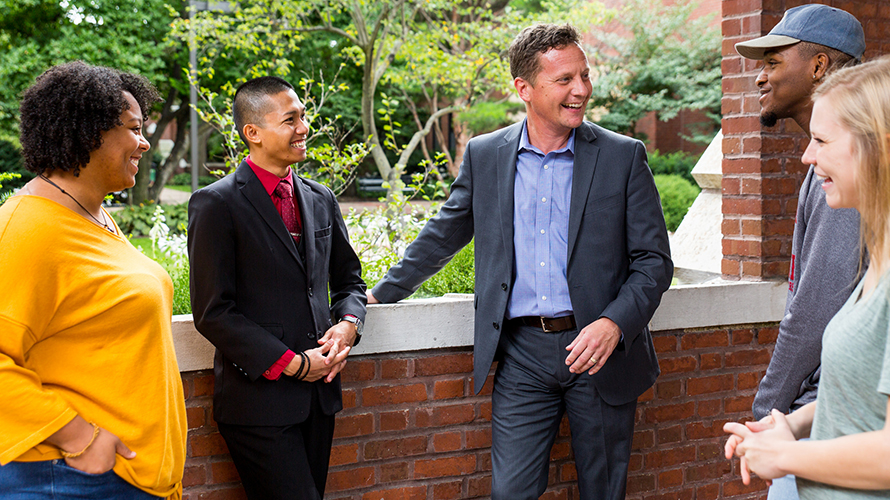Inclusion works
12/10/2018

Robert Reason professor for the ISU School of Education with students in Lagomarcino Hall. Photo by Ryan Riley
Teaching, research, and outreach extended by the College of Human Sciences begins with understanding and appreciating people. Recognizing that others’ life experiences can differ fundamentally from our own improves how we engage with them. Through wiser engagement, we deepen our relationships among friends, families, workplaces, and communities in mutually beneficial ways.
Human scientists study every aspect of people’s lives — including how multicultural factors affect their health and wellness, growth and development, education, and community-building endeavors. Groundbreaking research and engagement crosses racial barriers, identifies ethnic factors affecting how people thrive, and introduces better ways to meet individuals’ varying needs.
The principles of diversity, inclusion, and community are deeply embedded in the missions and strategic plans of Iowa State University and the College of Human Sciences.
Inclusion fuels achievement
When it comes to improving the bottom line for a business, outcomes for a nonprofit’s clients, learning opportunities for a student, or career success for a college graduate, the evidence is clear. Embracing diversity and inclusion matters.
A recent study by McKinsey & Company, an American-based consulting firm, examined the leadership demographics of 366 large public organizations from a wide range of industries. The researchers found that organizations in the top quartile of racial and ethnic diversity were 35 percent more likely to have financial returns above their national industry median.
Gender-diverse and engaged business units also outperform their less diverse, less engaged peers, according to a recent study by Gallup.
Researchers suggest that diverse teams perform better because they bring more perspectives, knowledge, and original thoughts to the conversation — all of which lead to better problem-solving and more insightful decisions.
“Diversity helps ensure the ideas and food we bring to the table will be the best in the world,” said alumna Kathy Wiemer (’76 dietetics).
Wiemer recently retired as senior fellow and director of the Bell Institute of Health, Nutrition and Food Safety at General Mills. Most recently she oversaw the company’s nutrition policy and regulation efforts.
“General Mills has products in over 100 countries,” Wiemer said. “The company views diversity and inclusion as essential to running a successful business.”
Companies like General Mills generate benefits by ensuring people genuinely engage with each other. The company’s leaders have built a workplace in which dissimilar people form trusting relationships and perform well together as colleagues.
Diversity optimizes learning
Establishing environments where each individual feels safe speaking their mind and open to hearing the perspectives of others is key to optimizing learning and performance for everyone, including students, said Robert Reason, a professor in the ISU School of Education who studies campus climate and student development.
“If there is a safe way to say, ‘I disagree with you on that’ or ‘Can you tell me more about your perspective?’ — that’s a really powerful learning experience,” Reason said.
“When I listen to you and your perspective and you listen to me and my perspective and we engage with those ideas, it creates cognitive dissonance,” Reason said. “I am forced to examine my earlier unexamined assumptions — either solidifying my assumptions or changing them — which means I’m learning. That’s the power of diversity.
“Getting to the point where I am comfortable with who I am interacting with you and with who you are — and disagreeing and learning from each other, respecting our multiple perspectives — that is where organizational effectiveness improves and our own personal productivity is improved, according to the research,” Reason said.
With so much potential for raising organizational performance at stake, it’s no wonder employers are seeking out job candidates who embrace diversity and inclusion.
Career-readiness hinges on trust-building
The ability to build “collaborative relationships with colleagues and customers representing diverse cultures, races, ages, genders, religions, lifestyles, and viewpoints” is one of the seven key competencies associated with career readiness among college graduates. The competencies were recently identified by the National Association of Colleges and Employers, whose members represent research universities and organizations ranging from Fortune 500 companies to government agencies.
Successful professionals like Emily Rusha-Hillique, the design director at Target Corporation who minored in apparel, merchandising, and design at Iowa State, advise students to embrace diversity.
“Whatever line of work you go into, whatever you are studying at school, you will be servicing a population that is extremely diverse,” Rusha-Hillque said.
“It’s such an important aspect for today’s students to have experience, training, and awareness of how important diversity and inclusion is,” Wiemer said. “It is critical they are able to work with a ‘diversity and inclusivity mindset.”
Key contacts
Cathy Curtis, communications director, College of Human Sciences, ccurtis@iastate.edu, 515-294-8175.
Isaac Sinclair, communications assistant, College of Human Sciences, hswriter@iastate.edu, 515-294-1326.